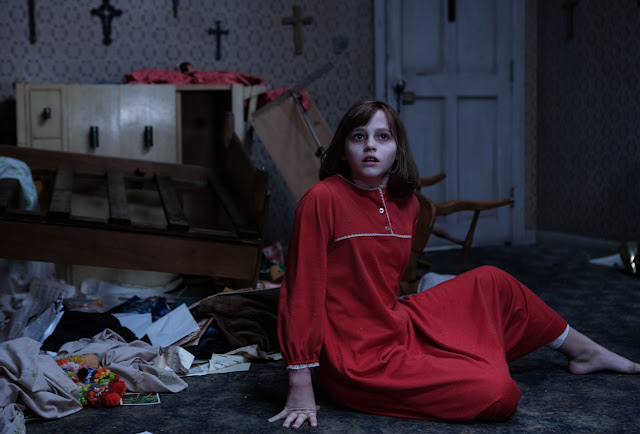"A harrowing but ambiguous tale of assassin trainees.”
Vincent Cassel trains pint-sized assassins in Partisan, the debut feature of
Australian director and co-writer Ariel Kleiman. In this dystopian drama, a boy
begins to question authorities in their cloistered cult as moral understanding
dawns upon him.
In the film’s prologue, Gregori (Cassel), a bearded
chain-smoking adult with piercing eyes, is lifting woods for what seems to be a
compound he is building in an unnamed dilapidated urban location. Seconds
later, he is seen approaching the hospital bed where Susanna (Florence Mezzara)
rests. She has just given birth to a boy and sweetly, Gregori names him
Alexander.
Eleven years later, Alexander (Jeremy Chabriel) is the
eldest among the children living in Gregori’s isolated commune. With wide
courtyard and gardens, the compound is accessible from the outside only by
tunnels and a locked gate. Like Susanna and Alexander, all the other women and
children in the commune are damaged and vulnerable. Gregori, the sole adult
male, is the cult leader and acts as sire for the broods. He appears to have
equal affection for all the children. He educates them various things like
gardening and some games. Most of all, he trains them how to kill using
seemingly innocent toys like paintball guns, dart blasters and balloons. He
teaches them the values of co-dependence, trustworthiness, obedience, and
defending themselves against the “outsiders”. Their progress is reflected on
gold stars pasted on a board and those who do well get to perform during
karaoke nights.
Alexander is the most skilled of them and for several times,
he has been sent outside the compound to put those lessons to practice. As to
why he needs to kill those people, he does not know. Neither the mothers nor the
children question Gregori. The established order in the commune is disturbed
when Gregori returns one day with a young mother, Magdalena (Katalin Hegedus),
her newborn child and her older son Leo (Alex Balaganskiy) who is roughly
Alexander’s age. When some chickens are slaughtered in the courtyard, Leo is
appalled with it and instantly protected the others. When Gregori confronts
him, Leo does not listen and instead defy him. Such disobedience affects
Alexander and he soon begins his own revolution.
With distinct style and confidence, Partisan tells a very provocative material with plenty of grits and
cloudiness. It is unsettling at heart as innocents are subtly corrupted by an
ill-willed system and by an outwardly altruistic benefactor. It is quite inspiriting
at the beginning as a kind-faced man fosters a culture built on humane values
to his household of several mothers and children. But mouths will gape when
children begins popping balloons and shooting paintballs with the cheers of the
others on the background. It becomes frightening as these kids take violence
lightly, especially when young Alexander ventures into the outside world and
cold-heartedly hunts his kill.
Such disturbing visuals are backed
up with portentous music or deafening solemnity and a creepily brooding atmosphere of obscurity.
There are no clear explanations and information are fed piecemeal. Hence, the
mystery keeps viewers hanging. This demands for patience and attention, and mainstream audience may not find this attractive.
In fact, the movie is filled with ambiguities. The geographical
and chronological setting itself is a wonder. However, the deserted streets,
abandoned buildings and rickety apartments outside the commune suggest a
developing nation in an adverse economic downfall. Similarly, the physical
interiors of the compound, despite its seclusion and own moral code, mirror the
dehumanized and desperate conditions of the bigger world where it belongs. The
mothers and children also appear to have come from different ethnicity as they
speak the English language in different accents.
Most importantly, the movie decidedly keeps Gregori in a fog.
His character is a mystery at the start and that never changes throughout. He
has a Messiah countenance with a sick mission, but as to why, it is not known.
His motivations are never explained, and not even any political or personal
beliefs, no matter how deranged, are presented to give us a better
understanding of the what, who and why of his personality. No traumatic past
experiences or hostile threats from the outside are depicted. In the end,
Gregori is hard to comprehend; he is as isolated and dusty as his kingdom is.
Cassel and Chabriel are the two outstanding actors in the
feature. Cassel, with his wolfish features and sneaky charm, is always
enigmatic and interesting. Here, he delivers a measured performance, giving a
silent quality to a ruthless villain. Chabriel matches Cassel perfectly. With
his feline blue-green eyes and dead gaze, he is just as menacing and
surprising.
Partisan is proud
and certain of its storytelling. It has an evocative central premise and though
its socio-political context parallels many aspects of world civilization, it is
too vague and abstract to leave a solid statement.
Production company: Warp Films Australia,
in association with Protagonist Pictures, Animal Kingdom, Film Victoria, DDP
Studios
Cast: Vincent Cassel, Jeremy Chabriel,
Florence Mezzara, Alex Balaganskiy, Frank Moylan, Katalin Hegedus
Director: Ariel Kleiman
Screenwriters: Ariel Kleiman, Sarah Cyngler
Producers: Sarah Shaw, Anna McLeish
Executive producers: Frederick W. Green,
Joshua Astrachan, David Kaplan, Nigel Williams
Director of photography: Germain McMicking
Production designer: Steven Jones-Evans,
Sarah Cyngler
Costume designer: Maria Pattison, Sarah
Cyngler
Music: Daniel Lopatin
Editors: Jack Hutchings, Chris Wyatt


























0 comments:
Post a Comment